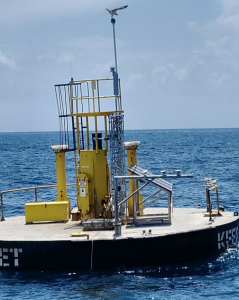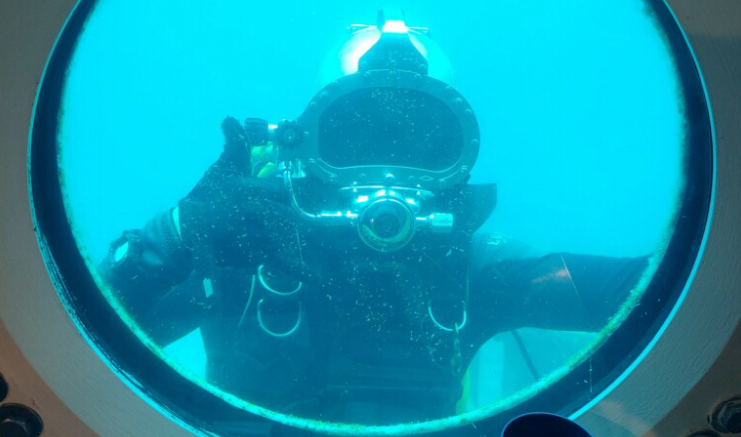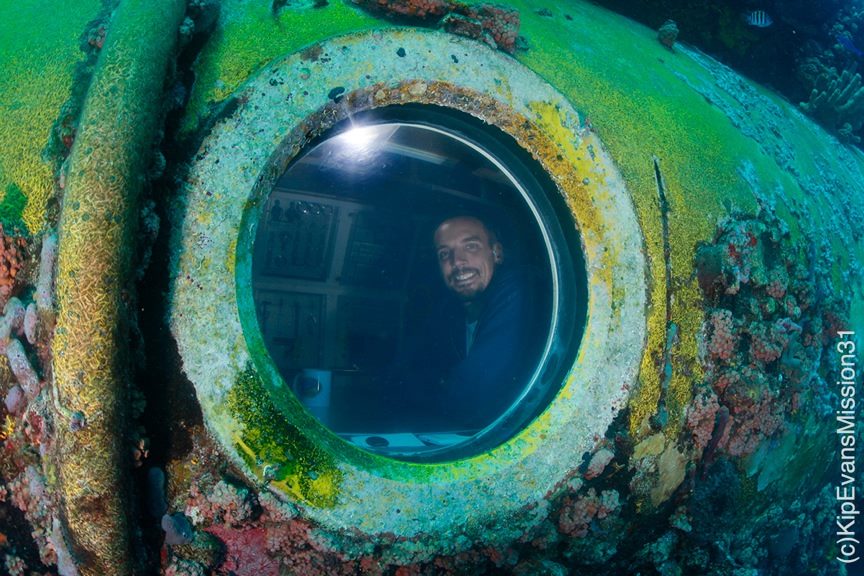Guido Gonzalez/Assistant Entertainment Director
The desire to return to normalcy is a sentiment we all share in the midst of the coronavirus pandemic, whether it’s going to the movies, getting a haircut or diving 60 feet below the ocean surface.
64-year-old veteran aquanaut Mark Hulsbeck longs for the bus sized underwater laboratory deep in the warm turquoise waters of the Florida Keys, where he lives and works.
The Aquarius Reef Base has been owned and operated by Florida International University since 2013. It is the world’s only permanent underwater habitat.
The only way to access the lab is by diving 62 feet into the ocean and entering through a wet porch, also known as a moon door.

The lab’s close proximity to local marine life allows researchers to study coral reefs and its inhabitants for long periods of time. The base is also used for training by NASA astronauts.
From the outside, the laboratory looks as though it’s lifted from a high-tech sci-fi dystopia, slowly merging with its surrounding coral. Inside, the place looks like a space station cramped with machinery to sustain life.

Before returning to land to quarantine, Hulsbeck’s last underwater visit was in March for maintenance work, specifically to paint the inside of the habitat.
“We had to wear full-face masks with their own air supply system,” Hulsbeck said. “We couldn’t breathe the atmosphere in there.”
Apart from researching the marine environment, Hulsbeck spends most of his time in the lab maintaining its structural integrity. His responsibilities include maintaining ideal oxygen and pressure levels as well as acting as mission control for the divers outside on their research missions.

Hulsbeck officially serves as the habitat technician.
“We’re the ones who actually operate all the systems,” Hulsbeck said. “As for the scientists, we train them on how to live underwater.”
Thankfully, Hulsbeck and other aquanauts managed to complete all of their objectives before quarantine started at the top side, but since then no one has returned to Aquarius.
However, there are ongoing discussions about the possibility of resuming diving missions under special circumstances.
“FIU realizes the situation we’re in,” said Hulsbeck. “We’re trying to get to the point where we can have special conditions for a few of us to come down, keep our separation and safely do diving operations.”
Negligence caused by failing to quarantine is a legitimate concern, as it can invite serious consequences for the laboratory.
Aquarius is no stranger to disaster and was severely damaged in the past. Unfortunately, this is expected given Florida’s volatile weather, especially during hurricane season.
“For the integrity of the habitat itself, you want to make sure there’s no damage or leakage,” Hulsbeck said. “Big storms have come through before, and we have been damaged by them.”

One noteworthy incident Hulsbeck recalled was when the 80-ton Aquarius was actually lifted and moved six feet due to a strong storm, leading to flooding on the inside.
But water is not Hulsbeck’s only concern.
“Fire prevention is another huge thing,” Hulsbeck said. “We want to make sure all the wiring and all the electronics are in good condition.”
In the meantime, Hulsbeck is passing time by performing whatever duties he can back on land, which is mainly limited to maintenance work.
“We do whatever we can at the base,” Hulsbeck said. “We’re doing maintenance on the boats and some work at home as well.”
While maintenance duties might keep aquanauts like Hulsbeck briefly occupied, they simply don’t compare to literally sleeping with the fishes.
“That’s the frustrating part. We all want to get out there, check the habitat and make sure everything is okay,” he said.
Despite the busy schedule and numerous responsibilities that must be met, there is some free time on the side when working in Aquarius, like reading books or simply staring out through one of the portholes, an experience Hulsbeck dearly misses.
“We have a plethora of fish out there,” Hulsbeck said. “They actually come up and watch you and you can see their eyes following you as you walk inside.”
For more information about Aquarius, visit the official website at https://environment.fiu.edu/coastlines-and-oceans/aquarius/ and check out the video about it below.
Photos courtesy of Mark Hulsbeck
Have a story? Think we should look into something? Know a person or club that has a story worth telling? Let us know. You can remain anonymous. Email editor@fiusm.com






Be the first to comment on "An FIU Aquanaut’s Home Away from Land…and Air"